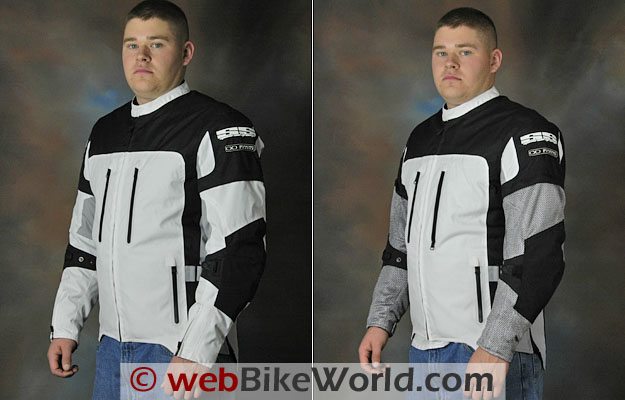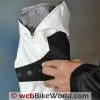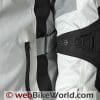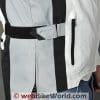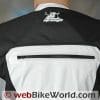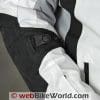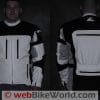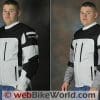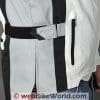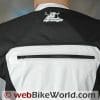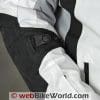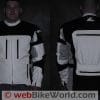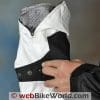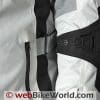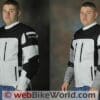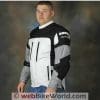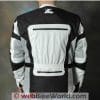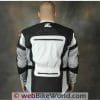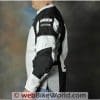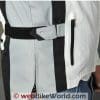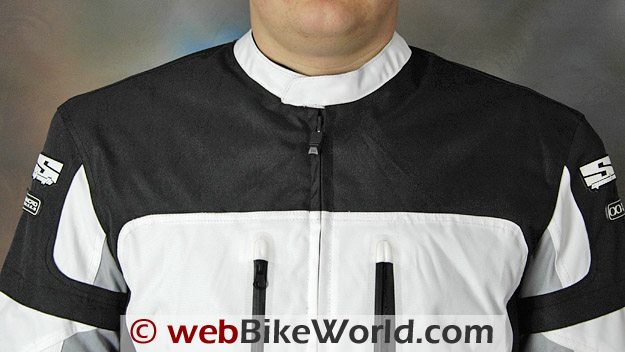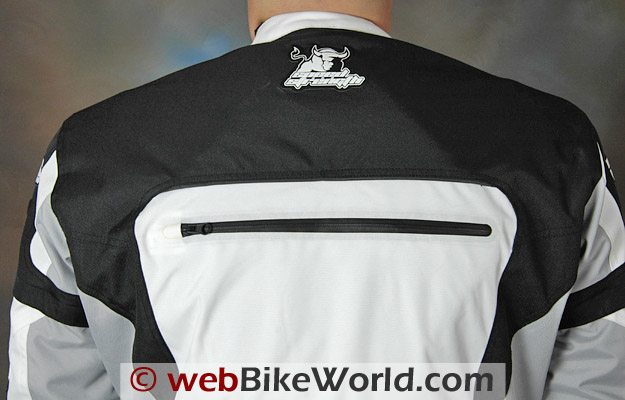Summary
The Speed and Strength Coast is Clear jacket has a surprise up its sleeve — literally! Match it with a pair of Coast is Clear pants for a do-it-all outfit at a bargain-basement price.
Background
There must be a zillion motorcycle apparel brand names, all competing with each other and all looking to pry some dollars out of your wallet. In fact, there are so many brands that it’s difficult to figure out what’s what, who’s who, what works and what doesn’t — much less who will get that all-important buck.
Factor in the economic conditions experienced over the last couple of years and who would think that it’s time for — you guessed it — yet one more brand?
Actually, this isn’t even fresh news at this point, because the quirkily-named “Speed and Strength” brand, owned by motorcycle products distributor Tucker Rocky, kicked off in 2008 and started to build momentum in 2009. So far, the Speed and Strength brand strategy appears to be aimed at taking a slice out of the Icon/Scorpion demographic but at a lower price point.
They may be on to something by competing in that particular market. Icon and Scorpion have pretty much owned it; they were probably the first to recognize that the underground street/stunt scene had “legs”. Since motorcycling has always been known for its rebel streak (and stunt riding on public roads is about as two-wheeled rebellious as one can get), there’s actually a precedent for the Speed and Strength marketing strategy.
Many companies have cashed in on the Motorcycle + Rebel = Profit formula over the years, including the Grandaddy of them all, Harley-Davidson. In fact, clothing and accessories have been part of the Harley persona since Day One; indeed, accessory sales have actually saved the company from bankruptcy at least once in its history. So why not one more?
The Speed and Strength Coast is Clear Jacket
Cashing in on the rebel persona is one thing; having the product to back it up is another. Saddled with a six-syllable name (Where do they come up with this stuff?), the Speed and Strength Coast is Clear jacket is best characterized as an all-arounder. It works on the street, for touring and — why not? — even some adventure touring.
But there are many other jackets that could be described the same and there’s no doubt about it — it’s very difficult to parse the details for any of them to determine what works and what doesn’t. So what’s the difference here?
It usually comes down to styling and price. You can pay a lot more for a similar jacket from one of the fancy brands, and to a certain extent, they all look about the same. You’ll never know which one offers the best protection or longevity and, unfortunately, there is no real concrete proof one way or the other anyway, so why not save a few bucks?
And that’s the “bottom line”, in more ways than one. In the end, price is a big draw for this jacket when compared to others. The Coast is Clear jacket has a list price of $199.95, which, as it turns out, is a very good bargain when you see what those two Bennies will get you.
Coast is Clear Jacket Features
The Coast is Clear jacket shell is made from the typical 600 denier polyester fabric found in many textile motorcycle garments (denier is a measurement of weight per unit length of a fiber, so a smaller number means a finer weave). The jacket comes in the white and black shown here or your choice of high-visibility orange or yellow. Oh, and there’s an all-black version too, but why chose it when you can have the added safety factor of bright colors for free?
Thus, we give kudos right away to Speed and Strength for making the jacket available in nice, safe colors. We’ve received many emails from readers asking where they can find a less expensive jacket in a high-viz color, and now you know.
The styling of the Coast is Clear jacket is taken directly from the School of Modern Motorcycling, Circa 2010, and it has just enough flair without being too “out there”.
The construction and quality is actually very good, especially for this kind of money. The two Speed and Strength jackets and two pairs of pants we are reviewing have no immediately recognizable quality problems.
The only semi-minor concern I have is about the type of material used for the stitching. It appears to be nylon or polyester thread, which is good, but the double rows of stitches are mostly top-mounted and they are exposed, rather than protected with folded or blind seams.
This is admittedly is a much easier and less expensive method for constructing a garment, and this is apparently where some of the cost-cutting is most readily noticed. But again, who really knows exactly how much of an issue this might be when it comes to protection? “You pays your money and you takes your chances”, goes the old saw.
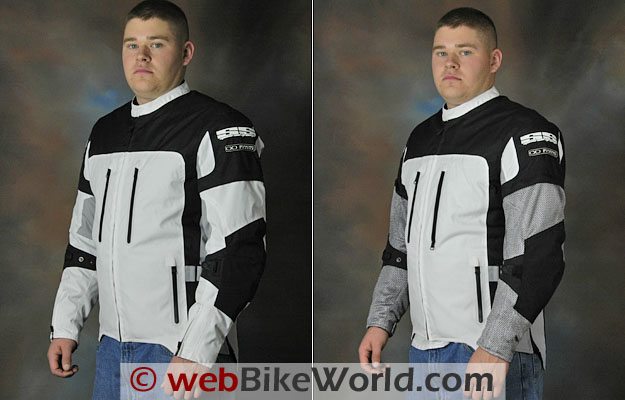
Removable Liners
The Coast is Clear jacket also features a separately removable water-resistant liner and vest insulating liner. The unbranded zippers are designed to allow the jacket shell to be worn with both liners or separately with either liner, and this is a real plus — and definitely unexpected at this price point.
I believe Rev’it was the first to start using this “four-way” liner system in jackets that are priced nearly two times the cost of the Coast is Clear, so let’s call this trickle-down technology. What are the “four ways”? Wearing the shell by itself; the shell with both liners; the shell with the insulating liner only or the shell with water-resistant liner.
Removable Sleeves
And the jacket has another surprise up its sleeve (an obvious pun!): The other very interesting (and unique) Coast is Clear jacket feature is its removable sleeves. The sleeves zip off the jacket shell just above the elbows, exposing a thick-looking silver mesh underneath.
Ingenious actually, and this definitely helps with ventilation, although it would have been nice if there were panels on the chest that did the same. Nevertheless, between the four-way liner system and the removable sleeves, this jacket has a lot of features for the money.
Removing the outer sleeve section is easily done by unzipping the zipper that is hidden underneath a flap of material just above the elbow. The inner mesh sleeve is permanently attached to the jacket shell and one thing to note is that this inner sleeve does not attach to the removable sleeve at the cuff.
The inner mesh sleeve has a small hook-and-loop tab for cuff diameter adjustment, while the outer sleeve has only a zipper that allows access to the inner cuff. This system doesn’t provide a lot of adjustment in the sleeve cuff; other than the small range of adjustment on the mesh cuff, you’re out of luck if you need to tighten it up. However, both cuffs are tapered down from the elbows to the cuff end, so it wasn’t as much of a bother as it might seem.
By the way, the sleeves can be stored in the water-resistant pocket at the lower rear section of the jacket.
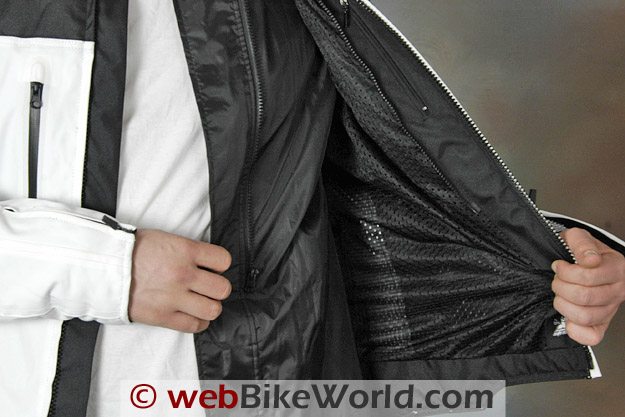
Water-Resistant Liner
There’s not a lot of detailed information at all on the website that Tucker Rocky set up for the Speed and Strength brand, and the retailers seem to have simply copied the text from that, so we don’t have many technical specs to give you.
The Coast is Clear liner is claimed “100% waterproof” but, as we’ve discussed in previous reviews, the word “waterproof” is bandied about way too loosely, so we don’t even use the term. Water-resistant is more like it because very few materials are truly “waterproof”, and our feeling is that if you’re going to claim so, then prove it.
The liner label says “100% Polyester” and it feels like your basic windbreaker-type material. The seams are not taped or heat sealed, but they are at least doubled over before they were stitched. In casual riding during evaluation, no leaks were detected but this is probably not a jacket that you’ll be wearing whilst riding in a 6-hour downpour.
But then again, what jacket is? If you truly want or need waterproof, buy a cheap rain suit and keep it handy. If you’re out in a storm tht is strong enough to push water through the shell, through the water-resistant liner, through the insulating vest, through your clothes and on to your skin, then it’s time to park it. Or, you could spend two to four times as much on one of those high-end brands…
The liner also does a good job at blocking the wind, as we so noted in our variable Spring weather that can go from the low 50’s in the morning to mid-80’s by afternoon.
Insulating Liner
The Coast is Clear jacket has a typical waffle-pattern insulating vest which, as I mentioned, can be zipped in to the jacket with or without the water-resistant liner.
It also does a decent job of keeping in the warmth and wearing the jacket both liners works very nicely. I’d estimate it should be comfortable down to the upper 40’s or perhaps even lower.
Wearing the vest only with the jacket shell is a nice solution for cool mornings or evenings, and actually having it as a vest only with no sleeves works out better for this because it’s much easier to insert or remove. It attaches with a zipper on either side of the jacket opening, using the same zipper that can attach the water-resistant liner. If the water-resistant liner is inserted, then the vest zips to a separate pair of zippers inside that.
The only downside of the vest is that it attaches to the jacket with the zippers on either side and with a snap and loop at the neck, so the body of the vest pulls out of the jacket when I pull my arms out of the jacket sleeves. It’s not a big deal, but means that the vest has to be stuffed back in to the shell to locate the arm holes correctly when I put the jacket back on.
And the Liner Notes…
The liner has a dual-use flap at the front to protect the zipper from wind and rain. It has a slightly unusual mode of operation, because the right side of the insulating liner has an attached flap that folds over and attaches to hook-and-loop on that side.
But when full wind and water protection for the zipper is needed, the flap on the right is unfolded and pulled off the hook-and-loop and then the flap on the left-hand side of the liner can be placed over the liner zipper and attached to the hook-and-loop on the right. It’s complicated to describe, but it works fine and offers a different option for the rider.
The main zipper on the jacket shell has a wind flap underneath that lies flat in back of the zipper when the jacket is closed, so the combination of that flap and the manually operated flap of the liner combine to protect against wind and water. Again, it’s a slightly different system than we’ve seen on other jackets, and we’re not sure why they did it this way, but it works.
Coast is Clear Jacket Venting
The venting system on the Coast is Clear jacket is pretty simple, consisting of a pair of vertical water-resistant-type (unbranded) zippers in the front. These serve a dual purpose as pockets also.
The vents/pockets are lined with mesh rather than a solid polyester material, so this does allow any air that enters to pass right through to the rider.
However, with the zipper opened, the opening doesn’t spread very wide, so not all that much air flows in. A large horizontal water-resistant-type zipper across the back can also be opened, which does seem to exhaust air through the low-pressure region in the rear. Together, the front and rear vents are about adequate, but not extraordinary.
Removing the sleeve portion on the shell helps and when the jacket is worn this way (without the water-resistant liner, of course), it definitely flows more air than a jacket without this feature. Perhaps if they would have added something like removable side panels under the arms (the light gray fabric seen in the photos), I think they’d have an even better system.
Another point in its favor is the jacket shell itself, which does not have a bonded wind-resistant liner inside. If the jacket shell is held up to a light source, it appears translucent rather than opaque. This allows air to pass right through the shell fabric, which noticeably improves ventilation, especially when riding a motorcycle without a windscreen.
So the bottom line here is that at this price point, the ventilation features are more than expected and when all of the hatches are opened for business, including the sleeves, and everything is taken into consideration, I’d say that overall the ventilation is better than average for this type of jacket.
Factor in the white color, which should help reflect some rays, and the Coast is Clear may be about as close as you’re likely to get to mesh jacket ventilation in a non-mesh form factor.
By the way, the white can get dirty at first, with little marks here and there quickly appearing. But it’s most noticeable at first only because there will be a high contrast between the pure white and the dirt when the jacket is new. As it gets broken in, and more and more smudges appear, the overall contrast goes down and the dirt becomes less noticeable only because it doesn’t stand out as much. Kind of weird, but it seems to work.
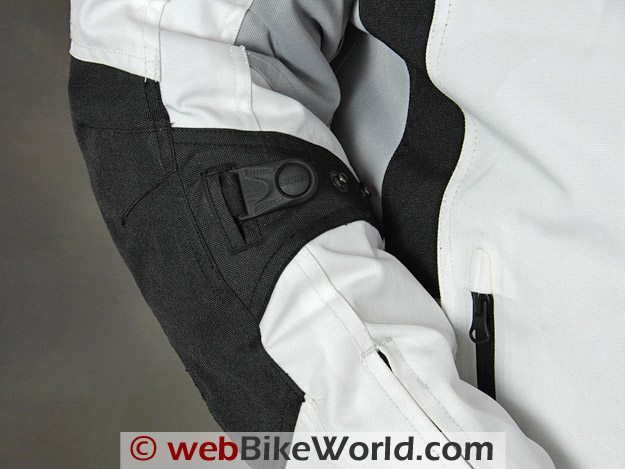
Zippers and Closures
All of the zippers used on the Coast is Clear jacket are unbranded, but they seem like good quality zippers, made from nylon and they are all of the tooth type with no coil zippers.
The main zipper and the liner zippers work well and no problems at all; the vent zippers use a smaller size of teeth and they do feel slightly stiff, although there are no problems to report.
The main zipper has a pull tab with a hard rubber cover. It would probably have been better if the rubber was softer, because this tab sticks out from the bottom of the jacket and can rub against the fuel tank, but so far hasn’t been a problem.
The collar tab on the Coast is Clear jacket (and the Hell ‘N Back jacket also) has only a single metal snap, with no adjustment. The “King Star” brand snap looks and feels strong and it’s covered by the fabric of the collar tab, all on the positive side, but having no adjustment is a negative, although it is big enough to fit my 17.5″ neck.
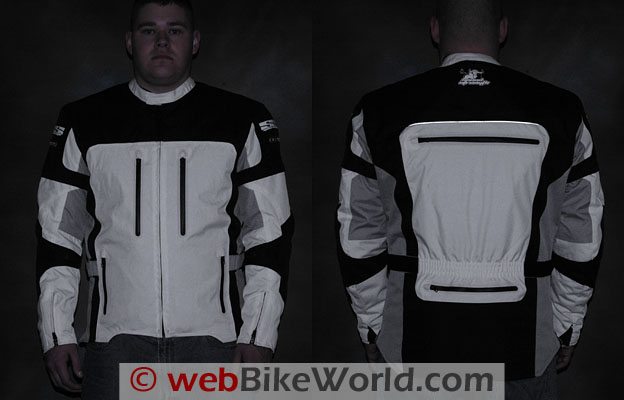
Reflectivity
Illustrated in the photo above, the Coast is Clear has minimal reflectivity but the white color does help. The single strip in the rear that can be seen reflecting the flash is actually made from the black reflective material sometimes used to blend in with the jacket details. These never seem to be as reflective as the best quality 3M Scotchlite type.
Jacket Sizing and Sleeve and Waist Adjusters
One good thing about motorcycle clothing designed for riders on the left side of the Atlantic is that the sizing is more, shall we say, generous? Or adequately roomy?
In fact, the size large Coast is Clear jacket shown here, which should be correct for my normal size, is probably closer to an XL when worn with no adjusters tightened but even with the vest and liner inserted. The body of the jacket and the sleeves are plenty roomy, and I think I might even fit into a size M, which would be a first for me. Remove the vest and the liner and the jacket size feels even roomier. Note that this generous sizing is also the case with the Speed and Strength pants we reviewed, and we’d suggest that the designers re-think their sizing strategy.
The model in the photos is generally a size larger than me and you can see that the jacket certainly isn’t too snug on him; in fact, the sizing is probably closer to accurate around his mid-section. Note that Speed and Strength leather jackets are listed in numerical U.S. men’s sizes, while the textile jackets are listed in letter sizes (e.g., S, M, L, etc.).
But you can also see in the photos that the arms appear to be slightly loose, although the single snap sleeve adjuster is on its widest setting in the photos. Tightening up the adjuster to its one and only notch (on the mesh sleeve) brings the elbow padding closer to the arm and does not affect the upper sleeve width. With the sleeves on, the elastic adjuster can be threaded through a slit in the sleeve and then allows up to a three-snap adjustment, which is good.
Checking the Speed and Strength size charts indicates an unusually large size range listed for their size L textile jackets of 42-45. We think that the correct range for this size L jacket should be more like 44-45; possibly even 46 with the liners removed. Remember that motorcycle jackets and pants should fit tighter than street clothes, although most people in the U.S. at least seem to wear motorcycle clothing too loose.
By the way, the Coast is Clear jacket is available in an expanded size range of S to 4XL, although the 4XL is available in black only.
The waist adjusters on the jacket are very nice though; they attach to a section of elastic that is sewn into the back of the jacket. So the waist can be cinched up nice and snug, although it doesn’t quite make up for the slight oversize indicated on the rest of the jacket body.
Anyway, something to keep in mind, this may be a jacket that you’ll need to try before you buy because the sizing may be larger than you think. We don’t have access to other sizes in the range so it’s uncertain if the larger-than-expected sizing runs true across all sizes.
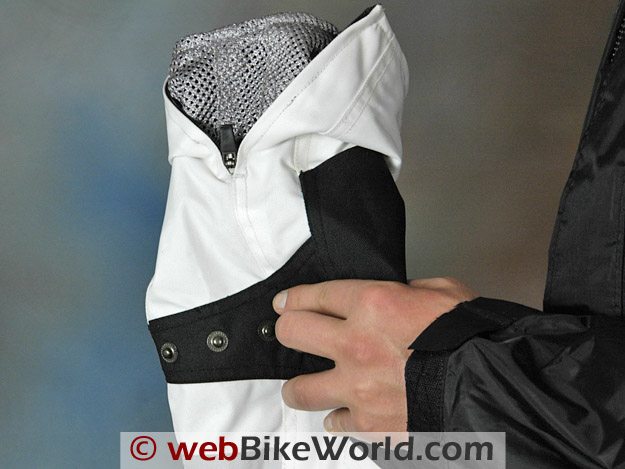
Sleeve Cuffs
The cuffs on the Coast is Clear jacket are different than other jackets — they do not have adjusters. The cuffs only have a small dart of elastic fabric at the end of the slightly tapered sleeves. There is also a vertical zipper on each sleeve, but it does nothing to tighten the sleeve cuff.
The mesh sleeve does have a very small piece of hook-and-loop to snug up the cuff. It has a small range of adjustment and seems designed to make sure the mesh sleeve is tight enough for the shell sleeve to fit over it when installed.
The arms are listed 35.5″ and without a good adjustment system, they seem to hang longer than they should but I am able to stuff them into the glove gauntlets as long as the gauntlet is adequately roomy. The jacket actually works better with shorter gloves that can be stuffed up under the sleeve cuff.
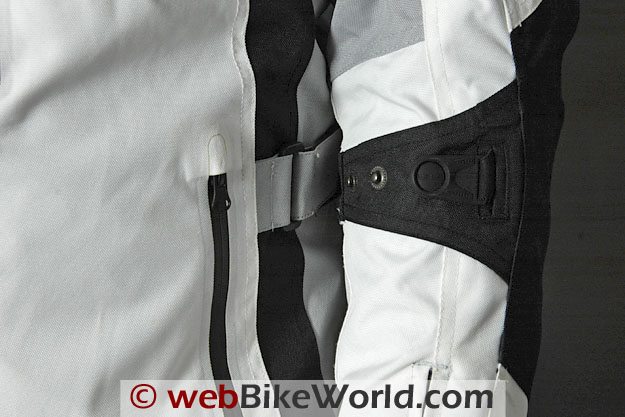
Pockets
The Coast is Clear jacket actually has a generous assortment of pockets, with the usual dual lined hand pockets in front covered with the same type of water-resistant zippers used in the upper chest vents, which are a combination vent (they’re meshed lined) and pocket. So this makes a total of four pockets in front, with two of those pockets doubling as vents.
The jacket has a wallet pocket sealed by a coil zipper and located on the inside of the left placket. This pocket is also lined and is handy for storing said wallet or cell phone.
At the rear is a deep pocket, covered by the water-resistant zipper, which can be used to store the sleeve arms when they’re removed and if it’s really stuffed, will also fit the two liners (I tried it), although it looks like a bustle when all of this is packed inside.
Safety and Protection
The Coast is Clear jacket features CE-approved (claimed) elbow and shoulder protectors, which feel well shaped and are integrated into the design.
The jacket also has a larger than normal back pad included, which actually feels pretty sturdy — or at least firmer than most of the wimpy padding that is supplied in jackets at this price range. Also, all of the protectors are removable.
The elbows and shoulders have no added sections of abrasive-resistant material on the outside of the shell, as far as I can tell; just the overlapping sections of the 600 denier fabric that can be seen as the styling details in the photos. The mesh under the sleeves feels thick and has a thin band of the black textile around where the elbow protector is located, but no other abrasion-resistant material.
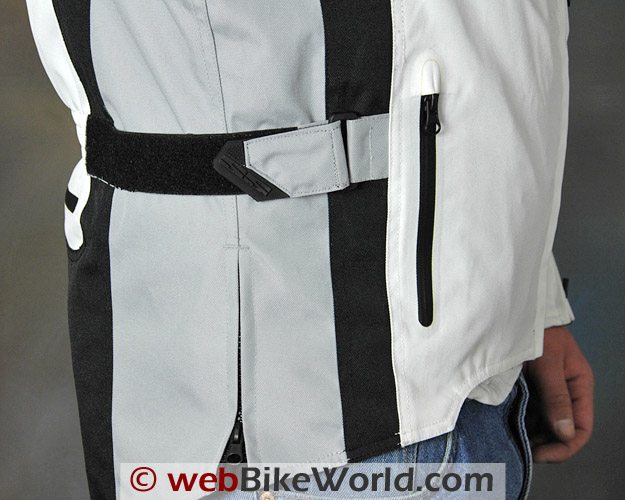
Miscellaneous Features
The jacket has an 8″ attachment zipper in the rear that attaches to the matching Coast is Clear and other Speed and Strength pants.
The jacket also has vertical zippers on either side that open up the hem to allow a wider bottom which helps when sitting on a touring bike.
The collar and cuffs are lined with a soft micro-fleece material and are comfortable, although the collar has only the single snap and is non-adjustable.
Riding With the Coast is Clear Jacket
The jacket feels comfortable when riding in either an upright position (as on the K1100LT or Multistrada) or slightly leaned over (R1100RS or GT1000). The temperatures during our evaluation period with the Speed and Strength clothing have ranged from cool for this time of year to extremely hot.
While neither the Coast is Clear or Hell ‘N Back jackets are our first choice for very hot weather, they actually work pretty well in a wide range of temperatures. With the outer sleeves removed and the liners stowed away, both jackets have more ventilation than just about anything I can think of outside of full mesh.
The removable sleeve system that uncovers the heavy mesh underneath is, I think, a unique idea that works. When the rear vent is open, it forms a ventilation system that feels like it pulls the air up through the sleeves and out the back. The front pocket/vents aren’t quite as successful, only because there’s nothing to hold them open, so depending upon the riding position, the pocket shape may change, either letting in more or less air.
But overall, I think the system works very well and both of these jackets have a lot of unique and useful features. The Coast is Clear jacket is $100.00 less expensive than the Hell ‘N Back jacket, but may be worth it, as you will see in Bill’s Hell ‘N Back review.
The Hell ‘N Back jacket feels like it uses some heavier-weight materials, along with a better water-resistant zipper system, and the water-resistant liner uses what appears to be (and is claimed to be) breathable material of higher quality than is used in the liner in the Coast is Clear jacket.
| Coast is Clear vs. Hell ‘N Back Jacket Differences | |
| Coast is Clear | Hell ‘N Back (review) |
|
|
Conclusion
The Speed and Strength Coast is Clear jacket may not have as many high-tech add-ons, styling features or extra abrasion resistant panels as some of the more expensive jackets, but for the price, this jacket is loaded with goodies and a few surprises, such as the four-way liner capability and removable sleeves — along with the high-visibility color choices — make it an excellent value.
See Also: Speed and Strength Hell ‘N Back Jacket | Speed and Strength Hell ‘N Back and Coast is Clear Pants
|
wBW Product Review: Speed and Strength Coast is Clear Jacket |
|
| Available From: Speed and Strength | List Price: $199.95 |
| Colors: Black, Orange, White, Yellow. Sizes: S to 4XL (4XL in black only). |
Made In: China |
| Review Date: July 2010 Note: Product provided by manufacturer for this review (more). | |
Owner Comments and Feedback
See details on submitting comments


